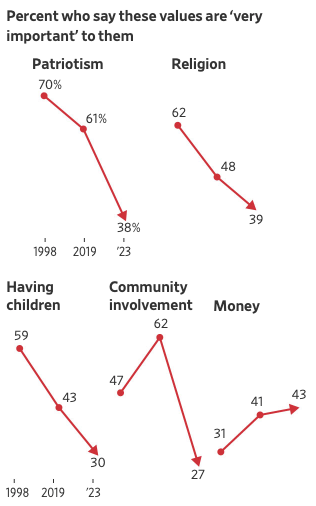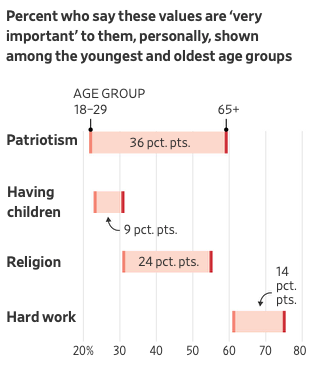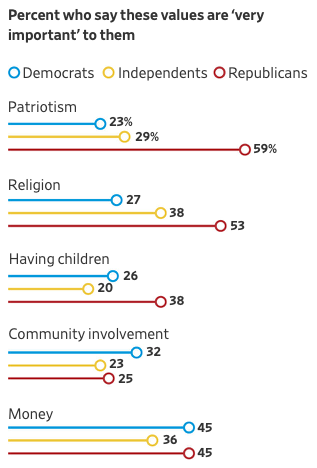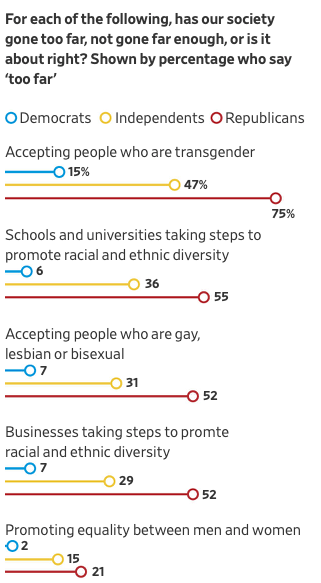As A Nation, We're Screwed.
-
From the WSJ:
Patriotism, religious faith, having children and other priorities that helped define the national character for generations are receding in importance to Americans, a new Wall Street Journal-NORC poll finds.
The survey, conducted with NORC at the University of Chicago, a nonpartisan research organization, also finds the country sharply divided by political party over social trends such as the push for racial diversity in businesses and the use of gender-neutral pronouns.
Some 38% of respondents said patriotism was very important to them, and 39% said religion was very important. That was down sharply from when the Journal first asked the question in 1998, when 70% deemed patriotism to be very important, and 62% said so of religion.
Percent who say these values are ‘very important’ to them
Patriotism
Religion
70%
62
61%
48
39
38%
1998
2019
'23
Having
children
Community
involvement
Money
62
59
47
43
43
41
31
30
27
1998
2019
'23
Source: WSJ/NORC poll of 1,019 adults conducted March 1–13, 2023; margin of error +/–4.1 pct. pts. Prior data from WSJ/NBC News telephone polls, most recently of 1,000 adults conducted Aug. 10–14, 2019; margin of error +/–3.1 pct. pts.
The share of Americans who say that having children, involvement in their community and hard work are very important values has also fallen. Tolerance for others, deemed very important by 80% of Americans as recently as four years ago, has fallen to 58% since then.NEWSLETTER SIGN-UP
Bill McInturff, a pollster who worked on a previous Journal survey that measured these attitudes along with NBC News, said that “these differences are so dramatic, it paints a new and surprising portrait of a changing America.’’ He surmised that “perhaps the toll of our political division, Covid and the lowest economic confidence in decades is having a startling effect on our core values.’’
A number of events have shaken and in some ways fractured the nation since the Journal first asked about unifying values, among them the Sept. 11, 2001, terrorist attacks, the financial crisis of 2008 and subsequent economic downturn and the rise of former President Donald Trump.
The only priority the Journal tested that has grown in importance in the past quarter-century is money, which was cited as very important by 43% in the new survey, up from 31% in 1998.
Aside from money, all age groups, including seniors, attached far less importance to these priorities and values than when pollsters asked about them in 1998 and 2019. But younger Americans in particular place low importance on these values, many of which were central to the lives of their parents.
Percent who say these values are ‘very important’ to them, personally, shown among the youngest and oldest age groups
AGE GROUP
18–29
65+
Patriotism
36 pct. pts.
Having
children
9 pct. pts.
Religion
24 pct. pts.
14
pct.
pts.
Hard work
20%
30
40
50
60
70
80
Source: WSJ/NORC poll of 1,019 adults conducted March 1–13, 2023; margin of error +/–4.1 pct. pts.
Some 23% of adults under age 30 said in the new survey that patriotism was very important to them personally, compared with 59% of seniors ages 65 or older. Some 31% of younger respondents said that religion was very important to them, compared with 55% among seniors.Only 23% of adults under age 30 said that having children was very important.
To Kevin Williams, a commercial and residential painter in Bend, Ore., many of these values are linked. Mr. Williams, 33 years old, said he thought that patriotism is declining as a civic value in tandem with rising individualism, a sense of entitlement among many people and a decline in community involvement, possibly because of people focusing on their own racial or cultural backgrounds rather than what Americans have in common.
For the rest...
-
The Wall Street Journal publishes an article about Americans focusing too much on money, but puts it behind a paywall.

-
The Wall Street Journal publishes an article about Americans focusing too much on money, but puts it behind a paywall.
I can afford the $1 a week I'm paying for the subscription.




@George-K said in As A Nation, We're Screwed.:
I can afford the $1 a week I'm paying for the subscription.
WTF! That's almost the price of an entire egg!
-
Meanwhile, look at the excerpt and the chart...Is the WSJ right? Are Americans losing what makes them Americans?
@Jolly said in As A Nation, We're Screwed.:
Meanwhile, look at the excerpt and the chart...Is the WSJ right? Are Americans losing what makes them Americans?
A self-hating, and ultimately religious, bent to popular culture for the past two or three generations, will tend to produce a new culture. The great Douglas Murray writes and speaks about this extensively.
-
It may be just one poll, but I think it's pretty representative.
At least from what I read and the folks I talk to.
-
@Catseye3 said in As A Nation, We're Screwed.:
Take a breath. It's one poll.
The "it's one <x>" dismissal of evidence works if x is an individual thing, such as an act or opinion of an individual person. But if x is designed to be a representative aggregate, such as this poll, dismissing it as "only one thing", is really a claim that the poll is either dishonest, or implemented badly.
On a related note, this claim that any given poll is dishonest or badly implemented is now an entrenched leftist debate tactic. Any presentation of any data leading to a conservative conclusion or even a demonstration that people have conservative opinions, is dismissed immediately by leftists, because polls are just too suspect. They'll go ahead and use their own data, thank you very much. Data which often rests on a claim of 'lived experience', or 'direct conversations with people with certain lived experiences'. I saw this play out last week in a debate which included a BLM founder and a black Democrat congressman. The other side of the debate included widely published author and researcher Ruy Texiera, who was not given credibility or trust by the leftist voices in the discussion, to present any data whatsoever.
This is where the cultural/political conversation is going, at the highest levels.
-
Folks, I appeal to the group at large...
Do you find -in general - that much of what the poll found is true?
-
Folks, I appeal to the group at large...
Do you find -in general - that much of what the poll found is true?
@Jolly said in As A Nation, We're Screwed.:
Folks, I appeal to the group at large...
Do you find -in general - that much of what the poll found is true?
I think it's a massive spectrum that aggregate data points oversimplify.
-
@Jolly said in As A Nation, We're Screwed.:
Folks, I appeal to the group at large...
Do you find -in general - that much of what the poll found is true?
I think it's a massive spectrum that aggregate data points oversimplify.
@Aqua-Letifer said in As A Nation, We're Screwed.:
@Jolly said in As A Nation, We're Screwed.:
Folks, I appeal to the group at large...
Do you find -in general - that much of what the poll found is true?
I think it's a massive spectrum that aggregate data points oversimplify.
I agree it's a big spectrum, but I think the generalities are reflected in other ways...Look at church attendence. Look at Military recruiting shortfalls. Look at how benevolent and civic organization numbers have dropped.
Aren't those reflections of this trend?
-
@Aqua-Letifer said in As A Nation, We're Screwed.:
@Jolly said in As A Nation, We're Screwed.:
Folks, I appeal to the group at large...
Do you find -in general - that much of what the poll found is true?
I think it's a massive spectrum that aggregate data points oversimplify.
I agree it's a big spectrum, but I think the generalities are reflected in other ways...Look at church attendence. Look at Military recruiting shortfalls. Look at how benevolent and civic organization numbers have dropped.
Aren't those reflections of this trend?
@Jolly said in As A Nation, We're Screwed.:
@Aqua-Letifer said in As A Nation, We're Screwed.:
@Jolly said in As A Nation, We're Screwed.:
Folks, I appeal to the group at large...
Do you find -in general - that much of what the poll found is true?
I think it's a massive spectrum that aggregate data points oversimplify.
I agree it's a big spectrum, but I think the generalities are reflected in other ways...Look at church attendence. Look at Military recruiting shortfalls. Look at how benevolent and civic organization numbers have dropped.
Aren't those reflections of this trend?
Here's my view on religion, which is ultimate Moonbat bait and probably you'd want to excommunicate me for it, too:
It's not going anywhere.
Okay sure, so younger people don't go to church as much. But they have beliefs. They act on those beliefs, and they place moral judgements of "that's bad" and " this is good" based on those beliefs. It's just that their religion doesn't include Sunday sermons.
If you're a diehard atheist who views organized religion as oppressive, superstitious brainwashing, then you worship at the altar of reason and rationality. Atheists would hate to describe it that way, but in terms of motive action, there's no relevant difference whatsoever.
And you can't tell me liberal fanatics don't have religious zeal.
I don't think we're any less religious than we ever were—we're just worshipping different stuff. Maybe it's the wrong kind of stuff, but we're still making sacrifices to deities and letting our beliefs define our morality for us. That's a different kind of problem than if we weren't actually religious. It's "pick your deity." You don't get to not have one, sorry.
-
When I was a teenager I remember my girlfriend's great uncle being scandalized that we were going to go to a jazz club 'On the Sabbath'.
Times change.
-
@Jolly said in As A Nation, We're Screwed.:
@Aqua-Letifer said in As A Nation, We're Screwed.:
@Jolly said in As A Nation, We're Screwed.:
Folks, I appeal to the group at large...
Do you find -in general - that much of what the poll found is true?
I think it's a massive spectrum that aggregate data points oversimplify.
I agree it's a big spectrum, but I think the generalities are reflected in other ways...Look at church attendence. Look at Military recruiting shortfalls. Look at how benevolent and civic organization numbers have dropped.
Aren't those reflections of this trend?
Here's my view on religion, which is ultimate Moonbat bait and probably you'd want to excommunicate me for it, too:
It's not going anywhere.
Okay sure, so younger people don't go to church as much. But they have beliefs. They act on those beliefs, and they place moral judgements of "that's bad" and " this is good" based on those beliefs. It's just that their religion doesn't include Sunday sermons.
If you're a diehard atheist who views organized religion as oppressive, superstitious brainwashing, then you worship at the altar of reason and rationality. Atheists would hate to describe it that way, but in terms of motive action, there's no relevant difference whatsoever.
And you can't tell me liberal fanatics don't have religious zeal.
I don't think we're any less religious than we ever were—we're just worshipping different stuff. Maybe it's the wrong kind of stuff, but we're still making sacrifices to deities and letting our beliefs define our morality for us. That's a different kind of problem than if we weren't actually religious. It's "pick your deity." You don't get to not have one, sorry.
@Aqua-Letifer said in As A Nation, We're Screwed.:
Okay sure, so younger people don't go to church as much. But they have beliefs. They act on those beliefs, and they place moral judgements of "that's bad" and " this is good" based on those beliefs. It's just that their religion doesn't include Sunday sermons.
There are times when I want to hit you over the head with Homie the Clown's rubber baton. But this one you have knocked out of the park. It is so refreshing to come across commentary on the many wonderfully different legitimate ways people can think and act and do. For many reasons, I needed to see these words. Thanks.
I vote against excommunication.